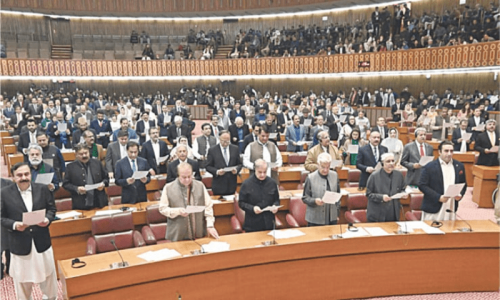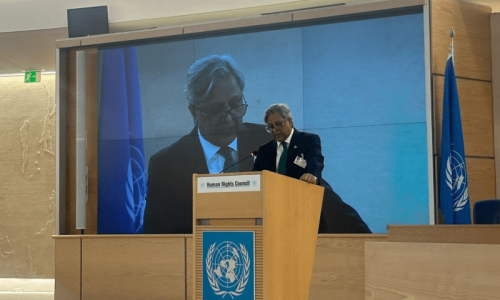KARACHI: Despite hopes of economic recovery following the IMF’s $7 billion bailout package, several industrial sectors are either shutting down units or reducing production due to the soaring costs of power and gas, which have hit production hard, leading to closures and job cuts in key industries.
However, stakeholders have expressed mixed views about the impact on employment. A drop in local cement sales and reduced steel production signal a slowdown in construction activity. Small textile units have already shut down, and medium-sized businesses on rented premises are fighting for survival.
Pakistan Business Council (PBC) CEO Ehsan A. Malik said that larger companies, with more resources, are better able to weather the temporary economic slowdown.
Sectors such as cement are affected by demand compression, following the tax burden in the FY25 budget, while others like steel are impacted by discrepancies in regional taxation, such as in erstwhile Fata and Pata, leaving manufacturers in the rest of the country unable to compete.
Despite hopes of recovery after IMF deal, several sectors are shutting down or reducing production
Mr Malik noted that while borrowing costs have fallen, energy prices remain uncompetitive, impacting exports. Larger businesses may survive, but their smaller supply chain partners are unlikely to fare as well.
Layoffs are more likely among smaller businesses, Mr Malik said, pointing out that capacity utilisation varies across industries, making it difficult to generalise.
Jawed Bilwani, president of the Karachi Chamber of Commerce and Industry (KCCI), said that smaller textile units have been nearly wiped out, and medium-sized units are following suit. Only larger firms with their own land and equity are able to invest in increased capacity to remain competitive. “There are no new entrants,” he said.
On crawling up textile exports, he linked it to orders diverted from Bangladesh to local entrepreneurs. “Lack of orders will loom when Bangladesh returns. Even an increase in capacity by mills in Vietnam also poses a challenge for local exports,” Mr Bilwani said.
Mr Bilwani highlighted that some major textile firms have already set up production facilities in the Middle East. If the situation continues to deteriorate in Pakistan, these firms have the option to shift operations abroad.
He also noted that many larger textile businesses are diversifying by investing in non-traditional sectors, both in Pakistan and overseas. These moves could lead to the closure of decades-old businesses if production costs and the local economic climate remain unfavourable.
“Not only power and gas rates cast gloom on production and exports, but problems in operating industries are multiplying owing to lack of inconsistency in economic policies,” he added.
Abdul Aleem, CEO of the Overseas Investors Chamber of Commerce and Industry (OICCI), said that while sectors such as auto manufacturing and consumer goods are struggling with weakened demand and periodic shutdowns, major layoffs have not yet been reported.
However, the country’s IT services sector is grappling with poor infrastructure, limiting its potential for export growth. Other industries, Mr Aleem said, are suffering from heavy taxation and inconsistent policy measures.
“Our pending tax refunds of over Rs108 billion is totally ignored by the relevant authorities,” he said, adding that the banking sector is also being threatened with high tax on profit.
“Has anybody seriously pondered on why big oil companies and other global multinational companies are exiting by handing over their operations to locals or other foreigners?” Mr Aleem asked. He urged the government to engage with stakeholders to turn Pakistan into a regional production hub.
Cement, steel sectors
Syed Wajid Bukhari, secretary general of the Pakistan Association of Large Steel Producers (PALSP), said the steel industry is facing its worst crisis in 50 years. Construction activity in the country has collapsed by 80pc to 90pc in recent years, he said.
“About 25-30pc steel units have been closed and about 25pc units have temporarily shut down,” he said, adding that the remaining 50pc are operating at reduced capacity, with many having laid off 30pc of their workforce.
“Sky-high energy costs, exorbitant interest rates and heavy taxation are killing the industry,” Mr Bukhari said. He warned that the informal sector, which evades taxes and produces substandard steel, is thriving, while the regulated industry is being driven towards closure. “The government is acting as a mere spectator,” he said.
Published in Dawn, October 6th, 2024

















































